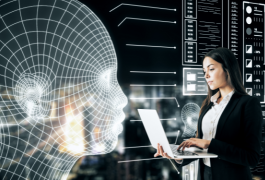
A new study from the Massachusetts Institute of Technology (MIT) looks at concerns about artificial intelligence (AI) replacing human jobs. The research delved into the cost-effectiveness of AI in various tasks, with a focus on jobs utilizing computer vision technology, such as teachers and property appraisers. The findings revealed that only 23% of workers, based on their wage costs, could be efficiently replaced by AI. In certain cases, due to the high expenses associated with AI-assisted visual recognition, humans remained the more economical choice.
The widespread adoption of AI in various industries gained momentum following the success of technologies like OpenAI’s ChatGPT and other generative tools, showcasing AI’s potential. Tech giants like Microsoft, Alphabet, Baidu, and Alibaba intensified their AI development efforts, albeit at a pace that some industry leaders considered too rapid. Concerns regarding the impact of AI on employment have been a longstanding issue.
Computer vision, a subset of AI enabling machines to extract meaningful information from digital images, found practical applications in object detection systems for autonomous vehicles and photo categorization on smartphones. The cost-benefit ratio of computer vision was particularly favorable in sectors like retail, transportation, warehousing, and healthcare, as noted in MIT’s research. The study, funded by the MIT-IBM Watson AI Lab, collected data through online surveys on approximately 1,000 visually-assisted tasks across 800 different occupations. It concluded that only 3% of such tasks can be cost-effectively automated today, but this figure could rise to 40% by 2030 if data costs decrease and accuracy improves.
Recent advancements in AI, exemplified by ChatGPT and rivals like Google’s Bard, have reignited concerns about AI displacing jobs. These new chatbots exhibit proficiency in tasks that were previously the exclusive domain of humans. The International Monetary Fund (IMF) warned that nearly 40% of jobs worldwide could be impacted by AI, necessitating a careful balance between AI’s potential benefits and its potential negative consequences.
Discussions about AI’s impact on the workforce took center stage at the World Economic Forum in Davos. Mustafa Suleyman, co-founder of Inflection AI and Google’s DeepMind, described AI systems as “fundamentally labor-replacing tools.” An illustrative case study in the MIT research focused on a hypothetical bakery where bakers visually inspect ingredients for quality control, which accounts for only 6% of their tasks. The study concluded that the time and wage savings from implementing cameras and an AI system were still far from justifying the cost of such a technological upgrade.
Neil Thompson, Director of the FutureTech Research Project at the MIT Computer Science and Artificial Intelligence Lab, summarized the study by highlighting that automation is expected to increase in retail and healthcare but decrease in sectors like construction, mining, or real estate.
